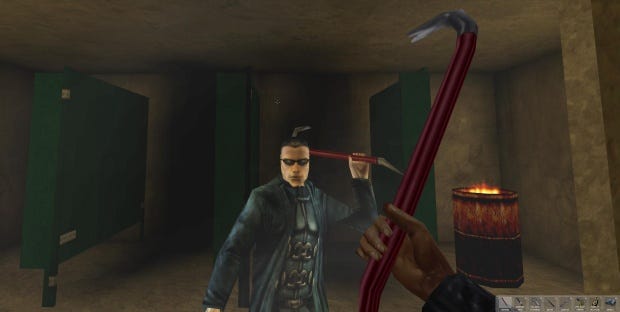Deus Ex Is 15: Memories Of Ion Storm's Classic FPS
Electronic older men
Deus Ex is 15 years old, which means it's almost old enough to move out of our house and stop having to do what we say. For now though, John, Alec, Adam and Alice decided to celebrate the relentless passing of time by jotting down some memories of Ion Storm's beloved immersive sim.
John
Returning to Deus Ex, and chronicling my time, shook my faith in the universe. Unquestionably the Best Game Ever, the only fault I remember its having was the poverty of its graphics. Turns out, it's riddled with issues, flaws, mistakes and ropey sections. What now?!
But gosh, despite all that, it's still incredible. It's still up there as one of the best games ever. The Emperor is wearing some pretty fine clothes, as it turns out.
It holds up. That's the key thing. 15 years on, it's still an engrossing, entertaining and mentally stimulating game. The shooting might be crappy, and the balance for stealth all over the place, but its level design is sublime and its story a splendid treat.
Alec
Deus Ex is, for me, inextricably linked with my first-ever attempt at games journalism. I penned an email to a mercifully now-defunct magazine (mercifully only in the sense that hopefully that missive no longer exists), absolutely convinced that it would be chosen for publication and I’d win a fiver or an oversize black t-shirt or whatever the prize was, and almost certainly be offered a job too. The letter was not published, presumably because some 90% of it was angry ranting about how bad Deus Ex’s ladders were and the remaining 10% was about murdering cats by jumping on them from great heights. I failed to even mention any of the elements which made Deus Ex such a landmark game. Yes, you’re right, I haven’t come along in the slightest in 15 years (I would in fact write my first published games journalism later that same year, but that’s another and altogether less laddery story).
The ladders are awful, though. The rest of the game’s pretty good if I recall correctly. I know there are a hundred reasons to praise it - the fidelity of its environments, meaningful choice of behaviour, talking to the monsters - but the abiding reason I feel so warm towards it is that, together with Half-Life, it was perhaps the first action game that had me feeling as though I was on a journey, full of unexpected turns and surprises, and which felt personal as well as merely combative. I felt I was doing something more than simply play through the levels of a videogame until a conclusion was reached. It all seemed to matter this time. This created an expectation (or entitlement?) which remains with me to this day, God help me.
Adam
My experience with Deus Ex is similar to Alec’s. I didn’t write a letter about ladders but Denton’s cyberpunk adventures elevated my expectations about what games could do.
I bought Deus Ex at a time when games were precious commodities, things that I saved for and stuck with until the end, bitter or sweet. I didn’t play a lot of games back then but the games that I did play were constant companions. Every detail mattered, and every nook and cranny was placed under a microscope. I tried everything, experimenting with abilities and AI quirks, pushing everything in the game until it broke. And things did break from time to time, but they usually did so in a way that fit the internal consistency of the world. More than anything else, what I remember when I think of Deus Ex is how convincing its rules were and how much I believe in its world.
Little did I realise, Deus Ex is one of the few games that supports such close scrutiny. There are points when its limits are uncomfortably clear but, on the whole, it’s a game that supported whatever playstyle I threw at it. This, I thought at the time, is how games work now. Good.
Whether age has been kind to Deus Ex or not, I can’t say with any certainty. It still feels like the game I loved when I first encountered it and I’m incapable of removing my rose-tinted super-cool-in-the-nineties shades. It’s one of the games that set the bar as to what I expect from first-person games of its kind though and that’s a good thing. It made me more demanding, sure, but it also made me appreciate the craft of generous, open-ended game design.
Deus Ex taught me to look closely and to question every element of a level’s design and a digital world’s integrity. It’s an education.
Alice
I petulantly avoided Deus Ex for almost a year. With chums chattering about opening lockers with crossbow bolts, finding secret routes, and skipping entire boss battles, I’d assumed it was one of the stat-heavy classic RPGs I found tedious - I didn’t even look at screenshots. I only played it when a pal thrust a burnt copy upon me, insisting I’d like it. I bought it very soon after.
Deus Ex trusted me and rewarded my curiosity. I found new routes and secret things because I went looking, not because I passed a perception check. People liked me because of things I’d done, not because of a charm stat. Its weapons, tools, and skills let me play as I wanted by changing my loadout rather than rerolling a new character. I woke, and euthanised, a man in cryogenic suspension because I was nosey.
We had a disagreement in the RPS treehouse recently over the opening level. Alec said the promise of Liberty Island was what we remember fondly recall about Deus Ex, while I said Liberty Island is awful guff and Hell’s Kitchen is when Deus Ex opens up. It felt like a larger world I was moving within, picking my way through it and uncovering mysteries by poking my beak in - and I’d surely never understand everything going on.
Deus Ex put me in a world and encouraged me to be curious. I wasn’t trying to min-max levels, find treasure, or clear a quest log; I wanted to see what I could do, find and learn.













